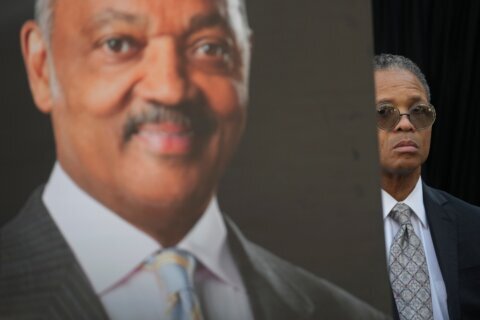WASHINGTON – One player was missing from the New York Mets’ opening day baseball game. Instead of swinging a bat, second baseman Daniel Murphy decided to take a swing at parenthood when he took paternity leave to witness the birth of his first-born son.
Murphy’s absence ushered in a wave of comments and criticism.
“One day, go see the baby be born and come back. You’re a Major League Baseball player. You can hire a nurse…” said WFAN’s Mike Francesa.
Former NFL quarterback Boomer Esiason of the Boomer & Carton Show said he would have scheduled a C-section before the start of the season to be on the field opening day.
The Major League Baseball Players Association and the MLB have a collective bargaining agreement that allows players to take three days of paternity leave.
Major League Baseball remains the only one of the four major professional leagues in North America to have a standardized paternity leave policy, the Associated Press reports, and is one of few companies in the U.S. to offer paid days off for paternity.
Anne Marie O’Neill, editor of parenting website mom.me, says the problem with paternity leave boils down to maternity leave in the U.S.
“The U.S. is one of four countries in the world that does not guarantee paid maternity leave. The other three are Liberia, Papua New Guinea and Swaziland,” O’Neill says.
European countries view paternity from a different point of view, with leave ranging from 10 to 18 days, O’Neill says.
In the U.S., paternity leave for a lot of men involves saving up and cobbling together sick days, vacations days and unpaid days.
Ed Pfueller, a photographer for Catholic University, just returned from nine weeks off, using the Family and Medical Leave Act.
“FMLA is 12 weeks that you can take, but you’re not guaranteed any pay or anything like that. It allows you, at least here, to use my sick time or vacation,” he says.
Ryan Owens, a branch chief with the Coast Guard, says he used a combination of vacation and sick days for all four of his children. David Lindsey, a director at Media DC, took a combination of vacation and sick days for the first week of paternity, and worked from home for the second.
Alexandria paramedic Robert Honaker did not hesitate to take the time off when his baby was born.
“We ended up using all my sick days and most of our vacation time,” he says. “Even though I was wiped clean, I would do it again.”
Why is paternity leave so hard to take? Let us know in the comments section of this story, on Twitter or on the WTOP Facebook page. Until then, a local parent shares her take on paternity leave.
‘Real’ dads take paternity leave
By Jessica Peterson
When New York Mets second baseman Daniel Murphy took paternity leave for the birth of his first child, I doubt he or his wife Tori expected public criticism for their decision.
When the dust settled from the sports radio hosts’ firestorm, what surfaced was a much-needed conversation about paternity leave. Boomer may have fumbled the snap, but it got people talking about the importance of fatherhood, gender equality and the need for paid maternity leave in the U.S.
Today’s dads spend triple the amount of time with their children than they did a generation ago. That doesn’t threaten masculinity. If anything, it makes fathers more valuable because they are involved in raising their children. We could use more role models like Murphy, who made a wise decision to be with his wife and child during a time his family needed him.
Had he not been there, who would have made medical decisions for mother and child if something happened during his wife’s caesarean — a major operation? Murphy showed up, participated as a responsible father would, and even joked later about the challenges of changing a newborn’s diaper at 3 a.m. More men should talk about diaper changes, if you ask me.
Raising children is not a woman’s issue. Fathers who want to provide, financially, for their families, and also take paternity leave or other forms of flexible work, like having Fridays off in the summer to be with their kids, shouldn’t have to worry about flexibility stigma or putting their careers on the “daddy track.”
I married a man who believes in shared parenting and being a hands-on dad. We strive for a 50/50 balance of parenting and household responsibilities. It’s not perfect, but because of my husband, I have a better work-life balance. I can be a good mom and have a successful career. Had my husband been eligible for paternity leave when we had our son, we would have welcomed the opportunity. Unlike Sweden though, my maternity leave was unpaid, so money was a deciding factor for us, as it is for a majority of parents in the U.S., which is unfortunate.
The bottom line is fathers should have the option to take paternity leave without penalty. Not every job, company or career makes that possible, and I know it is especially burdensome for military families. But fathers, when the policy exists, and if you can, do as Murphy did: Step up to the plate and help remove the cultural barriers that prevent dads from taking this time to bond with their partners and children. You’ll go back to work happier you did, and maybe you’re boss and colleagues will take note.
Whether anyone — mother, father, Marissa Mayer or Daniel Murphy — chooses to take leave, and how much time they take, it’s a personal decision about what’s best for them.
It may not be right for your family, but respect it. Way to go Murphy and those who champion for paternity leave and father-baby bonding time. All go a long way toward shaping the future of our society’s children.
Editor’s Note: Jessica Peterson, author of the blog Jes’ Delights works full-time for a D.C. nonprofit and lives with her husband and 3-year-old son in Annapolis, Md. Jessica writes about being a working mother, work-life balance and making time for a healthy lifestyle. Her work and advice on topics — from maternity leave to mom guilt and keeping a positive perspective — have been featured on sites such as Care.com and Liberating Working Moms.
Follow @WTOP and @WTOPliving on Twitter and on the WTOP Facebook page.






